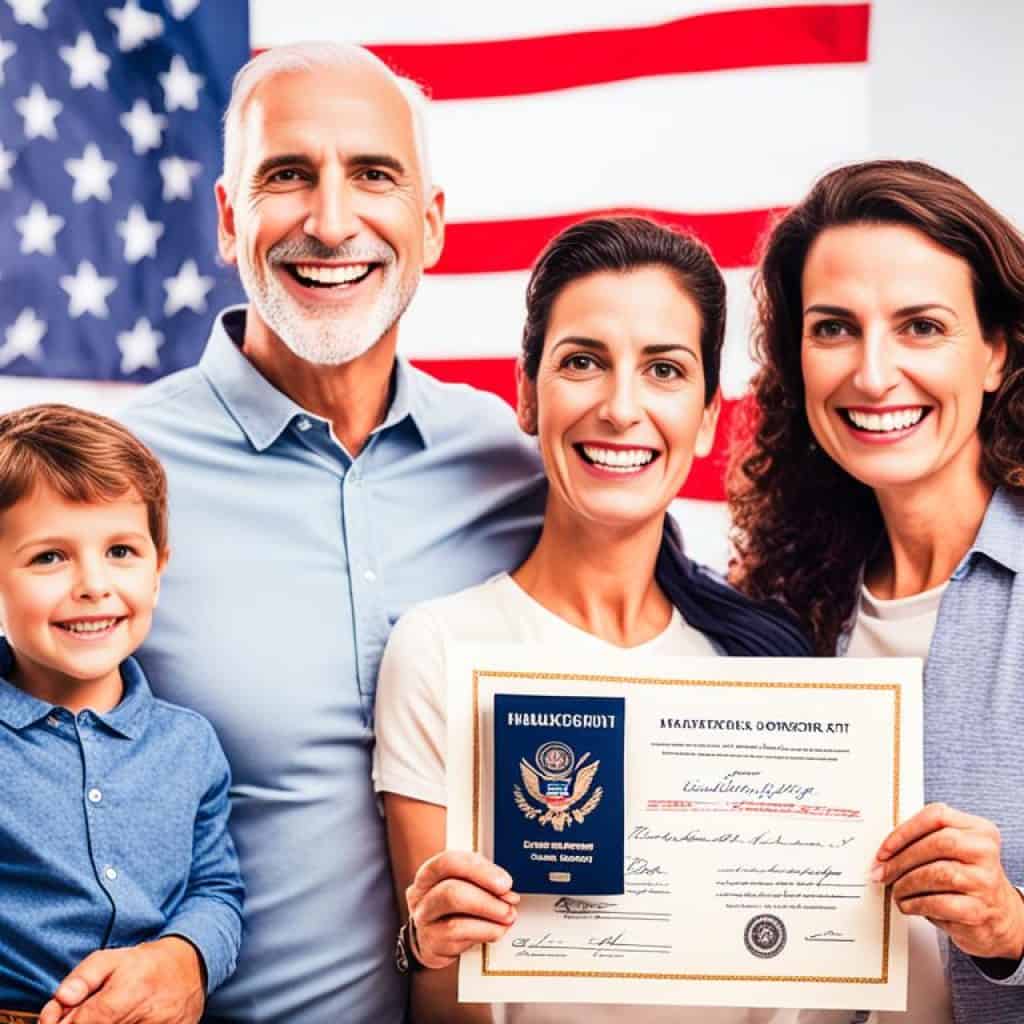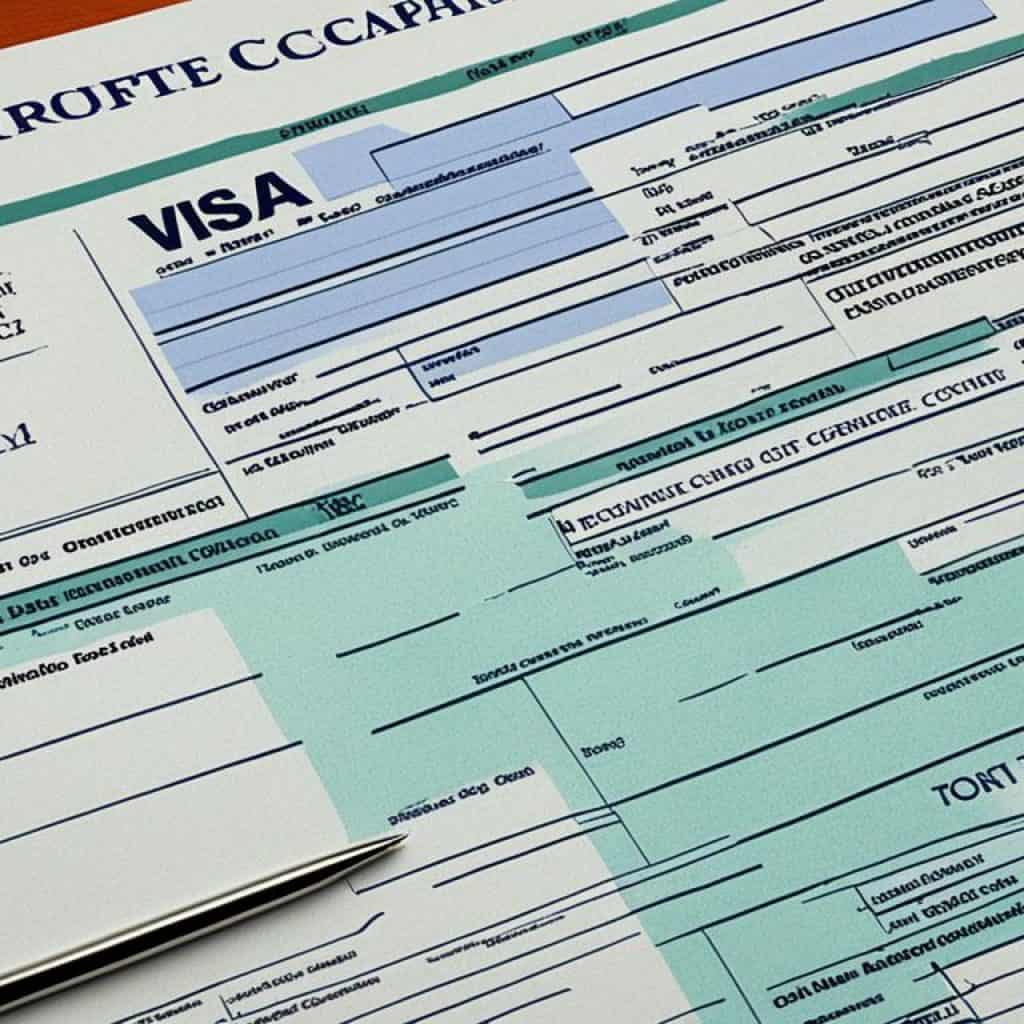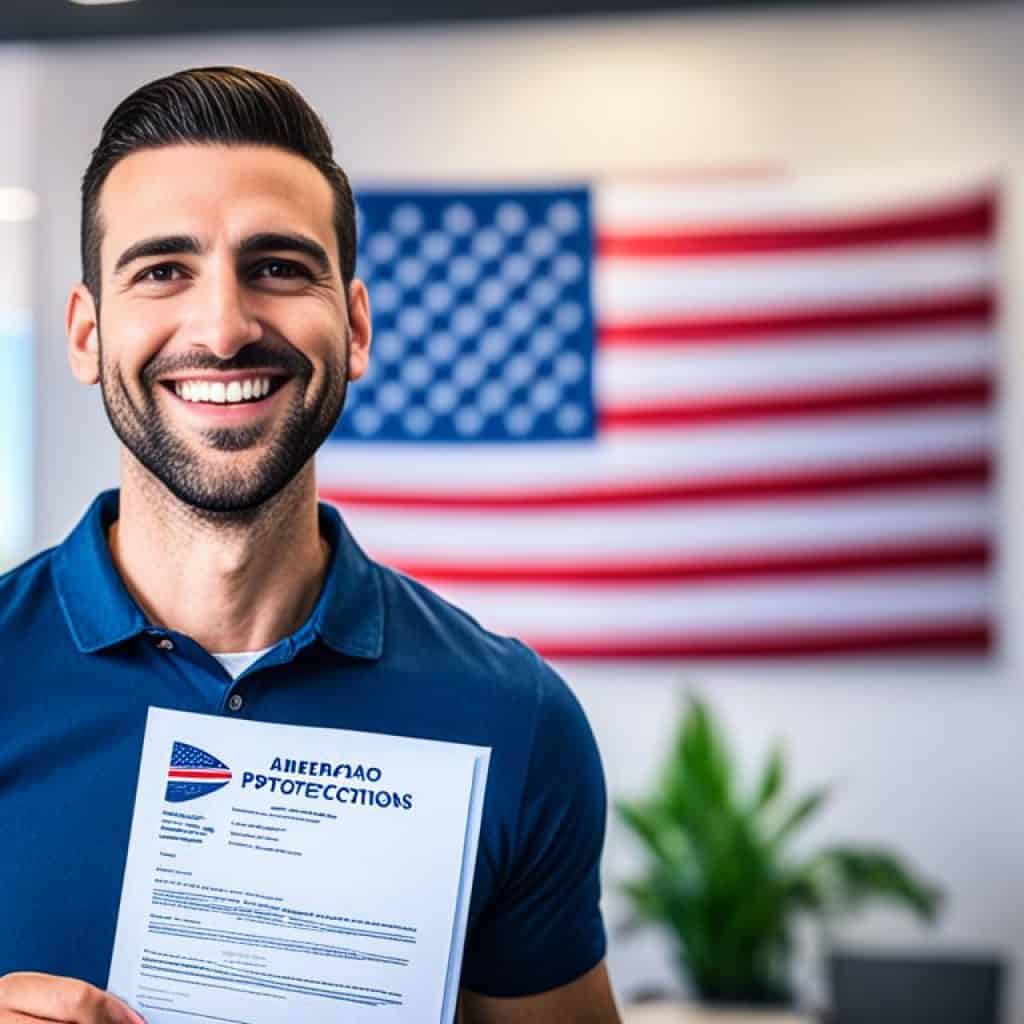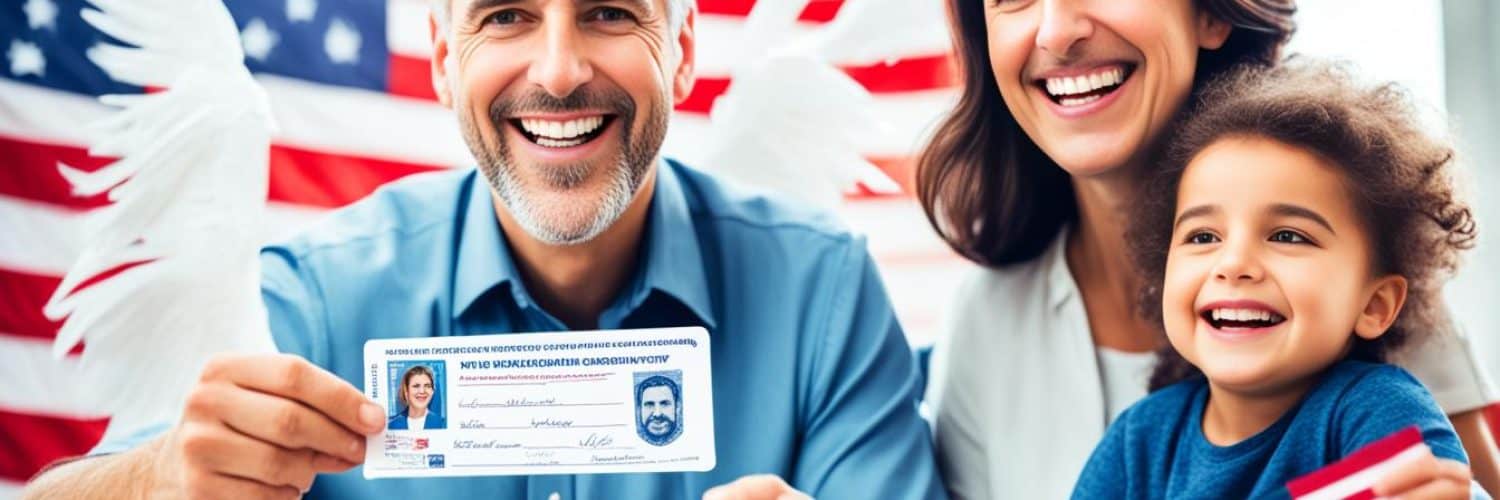Are you a married couple separated by borders? Do you dream of reuniting with your spouse in the land of opportunity? The CR-1 Visa, also known as the spouse visa or immigrant visa, holds the key to bringing families together in the United States. But what does it take to navigate the complexities of US immigration and successfully apply for the CR-1 Visa?
In this comprehensive guide, we’ll walk you through the process of obtaining a CR-1 Visa, step by step. From understanding the definition of a spouse for immigration purposes to filing the petition, meeting the requirements, and preparing for the visa interview, we’ll provide you with all the information you need to know.
So, if you’re ready to embark on your journey of love, commitment, and reunification, let’s dive into the world of CR-1 Visas and discover how you can make your dream of being together in the USA a reality.
Key Takeaways:
- CR-1 Visa is also known as the spouse visa or immigrant visa.
- It is designed to unite families in the USA.
- The CR-1 Visa is available for married couples where one spouse is a U.S. citizen and the other is a foreign national.
- The visa application process involves filing a petition, meeting requirements, and attending a visa interview.
- Proper planning and understanding of the process are crucial for a successful CR-1 Visa application.
Understanding the Definition of a Spouse
In the context of immigration, a spouse is defined as a legally wedded husband or wife. Merely living together without a legal marriage does not qualify for a spouse visa. However, common-law marriages may be recognized for immigration purposes depending on the laws of the country where the common-law marriage occurred. Polygamous marriages are not recognized, and only the first spouse is eligible for immigration purposes.
If you are in a legally recognized marriage, you may be eligible to apply for a spouse visa, also known as an immigrant visa or marriage visa, to join your partner in the United States. It is important to understand the specific requirements and guidelines for obtaining a spouse visa for immigration purposes.
Legal Requirements for a Spouse Visa
When applying for a spouse visa, you will need to provide evidence of your legal marriage, such as a marriage certificate issued by a government authority. This certificate should clearly state that the marriage is legally valid and recognized in the country where it took place.
If you are in a common-law marriage, you will need to provide additional documentation to prove the validity of your relationship. This may include affidavits from friends, family members, or other individuals who can attest to the nature of your relationship and the fact that you have been living together as a married couple.
“A spouse visa is an important avenue for couples who wish to be reunited in the United States. Understanding the legal definition of a spouse and the specific requirements for obtaining a spouse visa is crucial in navigating the immigration process.”
Documentation and Proof of Relationship
In addition to a valid marriage certificate or proof of common-law marriage, you will also need to provide other documentation to demonstrate the authenticity and ongoing nature of your relationship. This may include:
These documents serve as evidence of a bona fide marriage and can help establish the legitimacy of your relationship when applying for a spouse visa.
Consult an Immigration Attorney
Applying for a spouse visa can be a complex process, and it is important to seek guidance from an experienced immigration attorney who can guide you through the requirements and help ensure a successful application. They can assist you in gathering the necessary documentation, completing the forms accurately, and navigating any potential challenges that may arise during the application process.
Remember, a spouse visa can provide you and your partner with the opportunity to reunite in the United States and embark on a new chapter of your lives together. By understanding the definition of a spouse and meeting the legal requirements, you can make your immigration journey as smooth as possible.
Filing the Petition for CR-1 Visa
The CR-1 Visa application process starts with filing a Petition for Alien Relative, also known as Form I-130. This crucial form must be submitted to the Department of Homeland Security, specifically the U.S. Citizenship and Immigration Services (USCIS).
To ensure a smooth application process, it is essential to carefully follow the filing instructions provided by the USCIS. These instructions can be found on the USCIS website, where detailed guidance is available on how to properly complete and submit the petition.
Submitting the Form I-130 accurately and in compliance with the provided filing instructions is crucial for avoiding delays or complications in the CR-1 Visa application process. Taking the time to understand and follow these guidelines will contribute to a successful and efficient submission.
By diligently completing the required form and adhering to the USCIS instructions, applicants can set a strong foundation for their CR-1 Visa journey, bringing them one step closer to reuniting with their loved ones in the United States.
| Filing the Petition for CR-1 Visa | |
|---|---|
| CR-1 Visa petition form | Form I-130 |
| Filing authority | Department of Homeland Security |
| Form submission | U.S. Citizenship and Immigration Services (USCIS) |
| Filing instructions | Guidance available on the USCIS website |
Note: The following table summarizes the key details related to the filing of the Petition for CR-1 Visa:
Minimum Age Requirement for U.S. Sponsor
When applying for a CR-1 Visa, there is no minimum age requirement for a U.S. sponsor (petitioner) to file a petition. However, the sponsor must meet certain criteria to ensure the successful processing of the visa application.
The sponsor must be at least 18 years old and have a domicile (residence) in the United States. This requirement helps establish the sponsor’s legal status and connection to the country, ensuring a genuine intent to support the immigrant spouse.
Additionally, the sponsor must be able to sign the Affidavit of Support, which is a required form for the CR-1 Visa application. The Affidavit of Support is a legally binding document that demonstrates the sponsor’s financial ability to support the immigrant spouse upon their arrival in the United States.
The Affidavit of Support can be filed using either Form I-864 or I-864EZ, depending on the sponsor’s specific circumstances. These forms require detailed financial information and evidence to substantiate the sponsor’s ability to meet the minimum income requirements.
By meeting these minimum age and financial requirements, the U.S. sponsor can demonstrate their commitment to supporting their immigrant spouse throughout the CR-1 Visa application process and beyond.
Residence Requirement for U.S. Sponsor
As a U.S. sponsor, meeting the residence requirement is essential when applying for a CR-1 Visa. U.S. sponsors must establish their residence, also known as domicile, in the United States. This means demonstrating that they plan to live in the U.S. for the foreseeable future.
The residence requirement serves a crucial purpose in the CR-1 Visa application process. It is directly linked to the filing of the Affidavit of Support, a necessary document that demonstrates the sponsor’s commitment to financially supporting their immigrant spouse.
While there are exceptions to the residence requirement, living in the U.S. is generally mandatory for U.S. sponsors. By having a domestic residence, sponsors display their ability to fulfill the financial obligations associated with the CR-1 Visa application.
U.S. Citizenship and Immigration Services (USCIS) requires sponsors to have a domicile in the United States before they can proceed with the Affidavit of Support. This ensures that sponsors have stability and a sufficient financial foundation to support their immigrant spouse once they arrive in the country.
Exceptions to the Residence Requirement
It’s important to note that there are some exceptions to the residence requirement. In cases where a U.S. citizen is living abroad temporarily, they may still be eligible to file a CR-1 Visa petition. This exception applies to U.S. citizens who are residing abroad due to employment, but who intend to return to the United States with their immigrant spouse in the future.
Upgrading a Petition from LPR to U.S. Citizen
If you filed a petition for your spouse when you were a lawful permanent resident (LPR) and have since become a U.S. citizen, it is important to upgrade your petition from family second preference (F2) to immediate relative (IR). This will ensure that your spouse’s visa application is processed correctly and expeditiously. To upgrade your petition, you will need to provide proof of your U.S. citizenship to the National Visa Center (NVC).
To prove your U.S. citizenship, you can provide a copy of the biodata page of your U.S. passport or a certificate of naturalization. This documentation serves as conclusive evidence of your status as a U.S. citizen and allows the NVC to update your spouse’s visa application accordingly.
Upgrading your petition from LPR to U.S. citizen is a crucial step in the CR-1 Visa application process. By providing the necessary proof of citizenship, you ensure that your spouse’s application receives the appropriate consideration and priority it deserves.
| Proof of Citizenship Options: | |
|---|---|
| Proof of U.S. citizenship: |  |
| Copy of the biodata page of your U.S. passport | |
| Certificate of naturalization |
Next Steps for CR-1 Visa Application
Once the USCIS approves the petition for the CR-1 Visa, the case is transferred to the National Visa Center (NVC). The NVC plays a crucial role in processing the application and facilitating the next steps of the visa journey.
The first step after the transfer to the NVC is the assignment of a case number. This case number is essential for tracking the progress of the application.
The NVC will then instruct the applicant to complete Form DS-261, the Choice of Address and Agent form. This form allows the applicant to provide their preferred address for correspondence and designate an agent who can receive information regarding the visa application. It is important to accurately complete this form to ensure that all communication reaches the applicant in a timely manner.
Along with the completion of Form DS-261, the NVC provides instructions for submitting the required fees. These fees include the application processing fee and the Affidavit of Support fee. The Affidavit of Support is a critical document that demonstrates the sponsor’s ability to financially support the immigrant spouse during their stay in the United States.
Additionally, the NVC will provide instructions for submitting the necessary documentation. These documents may include birth certificates, marriage certificates, police certificates, and other supporting evidence. It is essential to carefully review the provided instructions and ensure that all required documentation is submitted accurately and within the specified timeframe.
Once all the necessary steps are completed and the NVC has received all required forms, fees, and documentation, they will schedule a visa interview at the U.S. Embassy or Consulate. The visa interview is an opportunity for the consular officer to assess the applicant’s eligibility and authenticity of their marriage.
During the interview, the consular officer may ask questions regarding the applicant’s relationship, background, and intentions in the United States. It is important to be well-prepared and provide honest and accurate answers.
After a successful visa interview, the consular officer will provide instructions for further steps, including medical examinations and fingerprinting. These additional steps are part of the comprehensive process to ensure the security and safety of all immigrants entering the United States.
Summary: Next Steps for CR-1 Visa Application
To summarize, the next steps for the CR-1 Visa application process after USCIS approval are as follows:
- Case transfer to the National Visa Center (NVC)
- Assignment of a case number
- Completion of Form DS-261, the Choice of Address and Agent form
- Submission of required fees, including the Affidavit of Support fee
- Submission of necessary documentation as instructed by the NVC
- Scheduling of a visa interview at the U.S. Embassy or Consulate
- Completion of medical examinations and fingerprinting
Following these steps and ensuring compliance with all requirements will help facilitate a successful CR-1 Visa application process. It is crucial to remain organized, thorough, and responsive to any requests or instructions from the NVC and the U.S. Embassy or Consulate.
Fees for CR-1 Visa Application
Various fees are associated with the CR-1 Visa application process. It’s important to be aware of these fees to plan your budget accordingly. Here are the main fees you can expect when applying for a CR-1 Visa:
1. USCIS Fees
The first fee you’ll encounter is the filing fee for the Immigrant Petition for Alien Relative (Form I-130) with the U.S. Citizenship and Immigration Services (USCIS). This fee covers the processing and evaluation of your petition.
2. National Visa Center Fees
Once your USCIS petition is approved, your case will be transferred to the National Visa Center (NVC). The NVC charges fees for processing your immigrant visa application (Form DS-260) and handling administrative tasks related to your case.
3. Medical Examination and Vaccination Costs
As part of the CR-1 Visa application process, you and your spouse will need to undergo a medical examination conducted by an approved panel physician. This examination ensures that you meet the health requirements for immigration. The cost of the medical examination and any necessary vaccinations will be additional expenses to consider.
4. Other Expenses
In addition to the above fees, there may be other expenses involved in the CR-1 Visa application process. These can include translation fees for documents, photocopying charges, and the cost of obtaining necessary documents. It’s important to consult the specific fee schedules and guidelines provided by the USCIS and NVC to get accurate and up-to-date information.
Planning your finances and being aware of the costs involved in the CR-1 Visa application process will help you budget effectively and avoid any unexpected financial surprises along the way.
| Fee Type | Fee Amount |
|---|---|
| USCIS Filing Fee (Form I-130) | Varies, check the USCIS website for current fees |
| NVC Processing Fee | $345 |
| Medical Examination and Vaccination Costs | Varies, check with the panel physician for pricing |
| Translation Fees | Varies depending on the provider and document complexity |
| Photocopying Charges | Varies depending on the number of copies needed |
| Document Acquisition Expenses | Varies, depending on the specific documents required |
Required Documentation for CR-1 Visa Application
Succeeding in your CR-1 Visa application requires the submission of several essential documents. These documents play a crucial role in demonstrating your eligibility and supporting your case. To ensure a complete application, make sure to gather and submit the following required documentation:
- Valid Passports: Present your valid passports for both the petitioner (U.S. citizen spouse) and the beneficiary (foreign national spouse).
- Affidavit of Support: Fill out and submit Form I-864, the Affidavit of Support, as proof of financial sponsorship for the immigrant spouse.
- Form DS-260: Complete and submit Form DS-260, the Online Immigrant Visa Application, providing detailed biographical information and background.
- Passport-sized Photographs: Include two passport-sized color photographs meeting the U.S. visa photo requirements.
- Civil Documents: Provide original or certified copies of important civil documents such as birth certificates (for both spouses) and marriage certificates.
- Medical Examination Forms: Undergo a medical examination conducted by an authorized physician approved by the U.S. Embassy or Consulate. Submit the completed medical examination forms as instructed.
All documents submitted should be either the original copies or certified copies if original documents are unavailable. If any documents require translation, provide certified translations in English. It is crucial to review the specific documentation requirements and guidelines for your country of origin to ensure compliance with the necessary standards.

Visa Interview for CR-1 Visa
Once the CR-1 Visa file is deemed complete by the National Visa Center (NVC), an interview appointment is scheduled for the applicant. The NVC sends the file to the U.S. Embassy or Consulate where the interview will take place. It is important for the applicant, petitioner, and any third-party agents to carefully review and follow the detailed instructions provided in the appointment emails or letters.
During the visa interview, the applicant must bring all required documents, including the original civil documents, to the Embassy or Consulate. These documents serve as evidence to support the application. The consular officer will thoroughly assess the applicant’s eligibility for the CR-1 Visa, ensuring all necessary requirements are met.
As part of the interview process, fingerprints will be taken to verify the applicant’s identity. This procedure helps ensure the authenticity and integrity of the visa application. It is crucial for the applicant to follow all instructions provided by the interviewing officer to facilitate a smooth interview experience.
The visa interview is a vital step in the CR-1 Visa application process, providing an opportunity for the applicant to demonstrate their eligibility and intentions to enter the United States as the spouse of a U.S. citizen. By presenting all required documents, undergoing fingerprinting, and confidently answering the consular officer’s questions, the applicant can increase their chances of a successful CR-1 Visa approval.
| Required Documents for Visa Interview | Additional Notes |
|---|---|
| Original civil documents | Documents such as birth certificates, marriage certificates, and divorce decrees |
| Valid passport | The passport should have a validity of at least six months beyond the intended entry to the United States |
| Photographs | Two passport-sized photographs with specific photo requirements |
| Medical examination forms | Completed medical examination results from an approved panel physician |
Rights and Protections for CR-1 Visa Applicants
When applying for the CR-1 Visa, it is crucial for applicants to be aware of their rights and the protections that exist within the United States. This knowledge ensures that individuals can navigate the visa process confidently and access the necessary support systems. To aid applicants in their understanding, a comprehensive Rights and Protections pamphlet is provided. This valuable resource covers important topics such as domestic violence, sexual assault, and child abuse.
Applicants are encouraged to thoroughly read the pamphlet prior to their visa interview. It serves as a guide to familiarize individuals with their rights and the legal protections available to them in the United States. By equipping themselves with this knowledge, applicants can better advocate for their well-being and seek help if needed.

Image caption: The Rights and Protections pamphlet provides vital information for CR-1 Visa applicants.
The consular officer conducting the visa interview will also summarize the content of the pamphlet, ensuring that the applicant fully comprehends their rights and the available support systems. This step helps to reinforce the importance of these protections and emphasizes the commitment of the United States to creating a safe and secure environment for all individuals residing within its borders.
By promoting awareness, understanding, and access to resources, the United States aims to protect and support CR-1 Visa applicants, fostering an environment where all individuals can thrive and contribute to society.
Medical Examination and Vaccination Requirements
Immigrant visa applicants, including CR-1 Visa applicants, are required to undergo a medical examination and meet specific vaccination requirements. The medical examination is conducted by a panel physician approved by the Embassy or Consulate. The physician will evaluate the applicant’s health and administer the necessary vaccinations, as outlined by U.S. immigration law. It is important for applicants to comply with these requirements to ensure a smooth processing of the CR-1 Visa application.
| Medical Examination Requirements | Vaccination Requirements |
|---|---|
|
|
It is crucial for applicants to schedule the medical examination at the earliest possible date to avoid any delays in the visa application process. It is also important to bring all relevant medical records, including a vaccination record, to the examination.
Once the examination is complete, the panel physician will provide the applicant with a sealed envelope containing the results. This envelope must remain sealed and should be submitted to the U.S. Embassy or Consulate at the time of the visa interview.
“The medical examination is a vital part of the CR-1 Visa application process. By ensuring that applicants meet health and vaccination requirements, the U.S. government seeks to protect the health and well-being of both immigrants and the general population.”
Conditional Residence and CR-1 Visa
If a foreign citizen spouse enters the United States on a CR-1 Visa and has been married for less than two years, their permanent resident status is considered “conditional.” The CR-1 Visa is a conditional resident visa, and after two years, the couple must apply together to remove the conditions from the green card. This process involves demonstrating the authenticity of the marriage and filing the necessary paperwork with USCIS. Once the conditions are removed, the spouse will receive an updated 10-year permanent resident card.
Two-Year Conditional Period
During the two-year conditional period, the couple must prove that their marriage is genuine and not solely for immigration purposes. USCIS closely scrutinizes the evidence provided to ensure the validity of the relationship. Examples of evidence include joint financial documents, shared leases or mortgages, photographs together, and testimonies from friends and family members. It is essential to submit a comprehensive package of supporting documents to strengthen the case and remove any doubts about the authenticity of the marriage.
Removing Conditions
To remove the conditions from the green card, the couple must file Form I-751, Petition to Remove Conditions on Residence. This form should be submitted jointly within the 90-day window before the expiration of the two-year conditional period. If the marriage has ended in divorce or the foreign spouse is facing extreme hardship, it may be possible to file the petition individually with a waiver. Each case is unique, and it is advisable to seek guidance from an immigration lawyer to determine the best course of action.
Permanent Resident Status
Once the conditions are successfully removed, the foreign citizen spouse will receive an updated 10-year permanent resident card, also known as a green card. This card grants them permanent resident status in the United States without any conditions or time limitations. As a permanent resident, they have the right to live and work in the USA indefinitely. They may also be eligible to apply for U.S. citizenship after meeting additional requirements, such as residency and language proficiency.
| CR-1 Visa Conditional Residence | Removal of Conditions | Permanent Resident Status |
|---|---|---|
| Foreign citizen spouse enters the U.S. on a CR-1 Visa | Couple applies jointly to remove conditions after two years | Spouse receives an updated 10-year permanent resident card |
| Conditions establish the genuineness of the marriage | Evidence must be submitted to prove the marriage is valid | Green card grants permanent resident status without conditions |
| Form I-751 petition must be filed jointly or with a waiver | Joint filing within 90-day window before expiration of conditional period | Potential eligibility to apply for U.S. citizenship after meeting additional requirements |
Conclusion
In summary, the CR-1 Visa offers a lifeline for married couples seeking to reunite in the United States. By following the application process, meeting the requirements, and providing the necessary documentation, couples can successfully navigate the complexities of US immigration. It is crucial to be well-prepared and seek professional assistance if needed, as the application process can be intricate and time-consuming.
By approaching the CR-1 Visa application with proper planning and guidance, couples can create a bright future together in the USA. The opportunity for a joyful reunion and the chance to build a life in America awaits those who meet the criteria and comply with the necessary procedures. Keep in mind that seeking professional advice and assistance can greatly increase the chances of a successful application.
In conclusion, the CR-1 Visa is an avenue for married couples to embark on a new chapter in their lives, uniting them in the United States. With determination, patience, and adherence to the application requirements, couples can fulfill their dreams of living together in a new country. The CR-1 Visa is a gateway to a promising future and the beginning of a shared journey in the land of opportunities.
FAQ
What is a CR-1 Visa?
A CR-1 Visa, also known as a spouse visa or immigrant visa, is designed to unite families in the USA. It is specifically intended for married couples where one spouse is a U.S. citizen and the other is a foreign national.
How is a spouse defined for immigration purposes?
In the context of immigration, a spouse is defined as a legally wedded husband or wife. Merely living together without a legal marriage does not qualify for a spouse visa. However, common-law marriages may be recognized for immigration purposes depending on the laws of the country where the common-law marriage occurred. Polygamous marriages are not recognized, and only the first spouse is eligible for immigration purposes.
What is the first step in the CR-1 Visa application process?
The first step is filing a Petition for Alien Relative, also known as Form I-130, with the U.S. Citizenship and Immigration Services (USCIS).
Is there a minimum age requirement for a U.S. sponsor to file a CR-1 Visa petition?
There is no minimum age requirement for a U.S. sponsor, but they must be at least 18 years old and have a domicile (residence) in the United States.
Does the U.S. sponsor need to have a residence in the United States?
Yes, it is necessary for the U.S. sponsor to have a residence (domicile) in the United States. This residence requirement is essential for filing the Affidavit of Support, which is a crucial document for the CR-1 Visa application.
What should be done if the petitioner becomes a U.S. citizen after filing the petition as a lawful permanent resident?
The petitioner should upgrade the petition from family second preference (F2) to immediate relative (IR) by providing proof of U.S. citizenship, such as a copy of the biodata page of the U.S. passport or a certificate of naturalization.
What happens after the USCIS approves the petition?
The case is transferred to the National Visa Center (NVC), which assigns a case number and provides instructions for completing Form DS-261, Choice of Address and Agent.
What fees are associated with the CR-1 Visa application process?
There are various fees, including filing fees with USCIS, processing fees with the National Visa Center, and fees for medical examinations and vaccinations. Additional costs may include translations, photocopying charges, and expenses related to obtaining necessary documents.
What documents are required for a CR-1 Visa application?
Required documents include valid passports, the Affidavit of Support, completed Form DS-260, photographs, civil documents (such as birth and marriage certificates), and medical examination forms. Original documents and certified copies should be brought to the visa interview, along with any necessary translations.
What happens during the CR-1 Visa interview?
The applicant’s visa interview is scheduled by the NVC and takes place at the U.S. Embassy or Consulate. Required documents, including the original civil documents, should be brought to the interview. Fingerprints will be taken, and the consular officer will assess the applicant’s eligibility for the CR-1 Visa.
What rights and protections are available to CR-1 Visa applicants?
Before the visa interview, applicants should read the Rights and Protections pamphlet, which provides information on domestic violence, sexual assault, and child abuse. During the interview, the consular officer will summarize the content of the pamphlet to ensure the applicant understands their rights and the available support systems.
Is a medical examination required for CR-1 Visa applicants?
Yes, immigrant visa applicants are required to undergo a medical examination conducted by a panel physician approved by the Embassy or Consulate. Vaccinations may also be required to meet U.S. immigration law requirements.
What happens if a foreign citizen spouse enters the United States on a CR-1 Visa and has been married for less than two years?
Their permanent resident status is considered “conditional.” After two years, the couple must apply together to remove the conditions from the green card by demonstrating the authenticity of the marriage and filing the necessary paperwork with USCIS.








Add comment